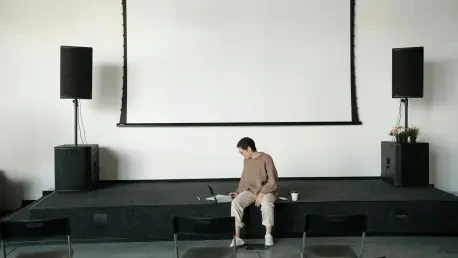In recent years, the event planning industry has undergone a remarkable transformation, propelled by the integration of cutting-edge technology and innovative design practices. This evolution was evident at the recent Catersource + The Special Event conference, where professionals gathered to discuss and showcase the future of event planning. The focus has shifted toward tech-driven, design-centric approaches that elevate the client experience, ensuring that events are not only memorable but also expertly crafted. The era of static, bland presentation methods has seen its sunset, with a dynamic shift toward visually compelling, story-driven client presentation decks. These sophisticated tools are becoming indispensable for planners, enabling them to deliver polished and engaging proposals efficiently. Such advancements represent a significant departure from conventional practices and mark the advent of a new paradigm where creativity and technology coalesce, setting the industry on a path to more meaningful and impactful client interactions.
The Role of AI and Automation in Event Design
Artificial intelligence is proving to be a game-changer in the event planning domain, especially in terms of design and creativity. Whereas traditional methods such as Pinterest boards once served as the primary source of inspiration, AI tools now empower planners to craft real-time visual concepts and floorplans tailored to client preferences. This technological leap not only accelerates the sales process but also facilitates clarity throughout the planning stages. Clients can visualize their events with precision and make informed decisions promptly. Moreover, automation technologies extend beyond creative designs to redefine the efficacy of communications within the industry. Despite these automated advancements, maintaining a consistent and genuine brand voice remains crucial. There is a growing appreciation for the balance between efficiency and personalization, as meticulously reviewed and customized communications ensure that the personal touch is not lost amidst the rising wave of technological interventions.
Enhancing Client Experiences Through Streamlined Processes
The conference illuminated how optimizing client experiences is paramount, emphasizing the smoothness of onboarding and offboarding processes. Platforms that manage the entire planning journey from personalized greetings to thorough post-event follow-ups have become essential tools for event professionals. By integrating such systems, planners can improve efficiency and significantly amplify client satisfaction, cultivating relationships that often result in loyal, returning patrons. Moreover, sustainability has emerged as a growing concern among clients, necessitating an industry-wide pivot toward environmentally friendly practices. With a rising demographic of clients keen on environmental consciousness, planners are urged to adopt sustainable measures actively. These include reducing waste, minimizing carbon emissions, and embracing eco-friendly materials and practices. By aligning with modern client values, event professionals not only meet contemporary standards but also set themselves apart in an increasingly competitive market.
Innovations Shaping the Future of Event Planning
The event planning industry has experienced a significant transformation in recent years, driven by the integration of modern technology and innovative design trends. At the recent Catersource + The Special Event conference, event professionals gathered to explore and demonstrate the future of this evolving industry. The focus has shifted toward tech-infused and design-focused approaches that enhance the client experience, making events not just memorable, but expertly curated. Gone are the days of static, uninspired presentation methods. Instead, there is a noticeable movement toward visually compelling, narrative-driven client presentation decks. These advanced tools are now essential for planners, allowing them to craft polished and engaging proposals swiftly. This shift signifies a move away from traditional practices, marking the onset of a new paradigm where creativity and technology merge. This sets the stage for more meaningful and impactful client interactions, ensuring that events are both innovative and memorable.









